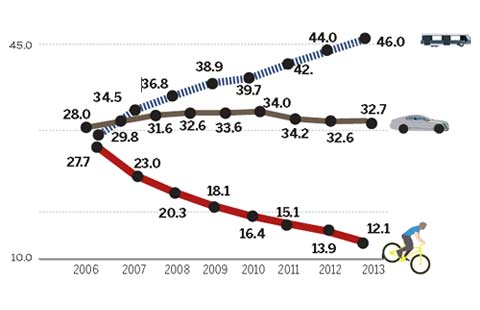NO to independence rattles British politics
Updated: 2014-09-22 07:40
By Fraser Cameron(China Daily)
|
|||||||||||
In rejecting the idea of an independent Scotland by 55 percent to 45 percent last Thursday Scotland's four million plus voters sent a clear signal that they wish to remain part of the United Kingdom. The vote will disappoint not only the nationalists in Scotland but also the hopes of separatists in many other countries, from Spain to Canada, who had hoped to re-launch their own independence campaigns on the back of a successful Yes vote in Scotland. The vote may also dampen separatist movements in China.
US President Barack Obama welcomed the outcome as he had made clear his support for a united UK also staying within the European Union. Other world leaders also expressed satisfaction at the result.
There was a remarkable 85 percent voter turnout in Scotland with people involved who had never before taken an interest in politics. For the first time 16 and 17 year olds could vote. The campaign was vigorous but peaceful. Prime Minister David Cameron described it as "a good example of democracy at work".
What happens now? The established London-based political parties were clearly panicked when just a week before the referendum polls showed the yes campaign slightly ahead. All three party leaders rushed to Scotland to pledge greater powers for the devolved parliament in Scotland. Scotland already has some fiscal powers as well as powers to cover education, health, transport, housing, policing and the environment
Speaking immediately after the referendum results were declared David Cameron said that he would swiftly introduce legislation that would allow Scotland greater powers on taxation, social security and health care. But he also added that these new powers would have to be accompanied by a rebalancing of the UK political system to give a greater voice to England where a majority of the UK population live. Was it right, he asked, that Scottish MPs could vote on matters affecting England but English MPs could not vote on Scottish matters? This is a sensitive issue as the opposition Labour Party traditionally enjoys a large majority in Scotland and if its MPs were not allowed to vote on English issues then there could be a quasi-permanent Conservative majority at Westminster.
Following his defeat at the polls, the leader of the Scottish Nationalist Party, Alex Salmond, announced that he would resign as leader of the party. His successor is likely to be Nicola Sturgeon, the current deputy leader. Salmond was probably the most charismatic politician in the UK with an ability to connect with ordinary citizens that David Cameron, Ed Miliband and Nick Clegg do not possess.
The referendum campaign was a historic event for the Scotland and UK. It was a colourful and passionate debate about the merits of a separate Scottish as opposed to a British identity. The yes campaign argued for a more egalitarian, Scandinavian-style society based on income from "Scotland's oil" in the North Sea. The no campaign pointed to the risks of independence. What currency would Scotland use? What would happen to pensions? Both sides argued that they would be better able to protect the cherished national health service.
Politics in Britain is unlikely to be the same again. The leader of the UK Independence Party, Nigel Farage, has called for a "federal Britain" - a strange demand from someone who spends most of his time trying to prevent the development of a federal Europe. Devolution to Wales, Northern Ireland and to English regions is likely to be on the agenda for the coming years. This internal debate, as well as the continuing question of the UK's membership of the EU, is likely to make the UK more inward-looking in the coming years.
The next general election is due in May 2015. If David Cameron reneges on his promise to introduce legislation to further boost powers for Scotland then the prospects for the Conservatives winning more parliamentary seats in Scotland will be poor. They currently only have one seat out of seventy-one which allows Alex Salmond to joke that there are more pandas in Scotland than Conservative MPs.
Although the yes campaign failed in its main aim of independence it has certainly changed the face of British politics.
The author is the director of the EU-Asia Centre in Brussels.
Related Stories
EU expresses joy at Scotland's 'No' 2014-09-20 08:07
UK shakeup looms after Scotland votes No 2014-09-20 08:04
10 cultural facts about Scotland 2014-09-18 12:59
'Yes' in Scotland could mean 'maybe' for Chinese companies 2014-09-18 08:34
Today's Top News
Scottish voters have rejected independence
Alibaba set to soar at $68 per share
Xi and Modi map out new era
Model filial son kept double life a secret
Parents of dead couple granted embryos
A rise in fallen stars
Thinnest-condom claims lead to lawsuit
US pledges diplomatic resolution of Ukraine crisis
Hot Topics
Lunar probe , China growth forecasts, Emission rules get tougher, China seen through 'colored lens', International board,
Editor's Picks

|

|

|

|

|

|





